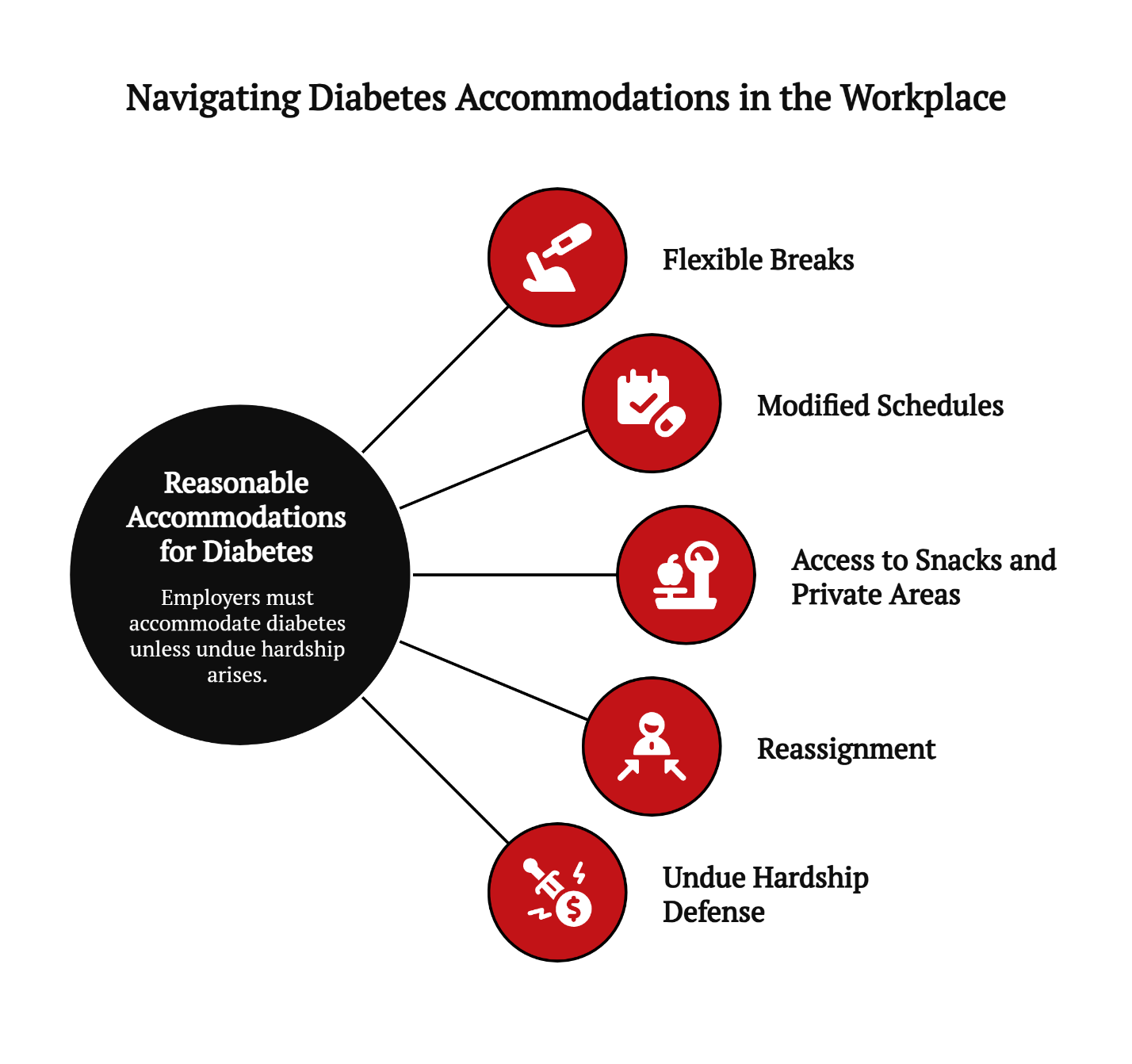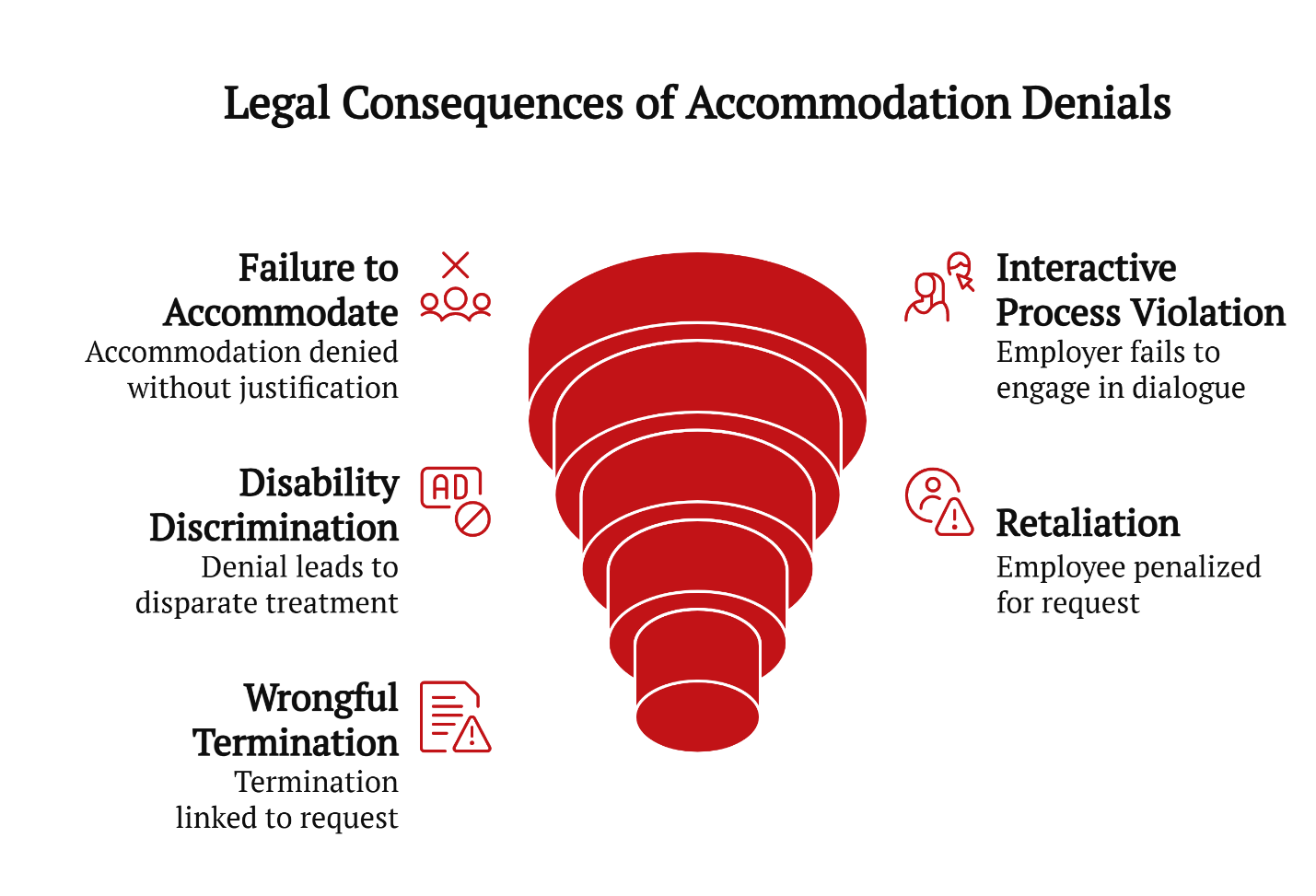📌 Key Takeaways
Denied Accommodations May Violate California Law: If an employer refuses to accommodate an employee with diabetes, it could constitute a violation of the California Fair Employment and Housing Act (FEHA), particularly if no undue hardship exists.
Interactive Process Is Legally Required: Employers must engage in a good-faith interactive process once they become aware of an employee’s need for accommodation—even without a formal written request. Failure to do so may itself be actionable under FEHA.
Diabetes Qualifies as a Disability: Both Type 1 and Type 2 diabetes are recognized disabilities under California and federal law, as they can significantly limit major life activities. This legal status triggers the right to request workplace adjustments.
Reasonable Accommodations Must Be Considered: Examples include flexible breaks, modified schedules, access to snacks or glucose testing areas, and job reassignment. Each request must be assessed based on specific job demands and business operations.
Legal Remedies Are Available for Violations: Employees may pursue claims for failure to accommodate, failure to engage in the interactive process, discrimination, retaliation, or wrongful termination. Remedies can include back pay, reinstatement, and attorney’s fees.
If your accommodation request was denied or ignored, the following article helps clarify your legal options under California law—and explains why consulting an employment attorney is a critical next step.
Managing diabetes in the workplace can require adjustments to accommodate medical needs. When an employer refuses to make those accommodations, it may raise serious legal concerns—particularly under California’s disability discrimination protections. This article provides an overview of how the California Fair Employment and Housing Act (FEHA) protects workers in such situations, and how a denial of accommodation could potentially result in legal liability.
Under California law, employers may be obligated to provide reasonable accommodations for employees with disabilities, including diabetes, unless the employer can show that doing so would impose an undue hardship. The legal consequences of noncompliance may vary depending on the facts of each case, and consultation with a qualified employment law attorney is strongly recommended for a complete evaluation.
Understanding the Right to Reasonable Accommodations for Diabetes

California Government Code § 12940(m) provides that employers must make reasonable accommodations for known disabilities unless doing so would create an undue hardship. Diabetes—whether Type 1 or Type 2—can qualify as a disability under FEHA and the Americans with Disabilities Act (ADA), as it may substantially limit major life activities such as endocrine function, eating, and glucose regulation.
Examples of accommodations may include, but are not limited to:
- Flexible or additional breaks to monitor blood sugar
- Modified schedules to align with insulin administration needs
- Access to snacks, beverages, or a private area for glucose testing
- Reassignment to a different position
These accommodations are evaluated case-by-case. What qualifies as reasonable in one employment context may not be reasonable in another. Employers may be excused from providing a reasonable accommodation it they can show that doing so would create a substantial difficulty or expense relative to their business operations. This is the FEHA defense of “undue hardship.”
Under California law, employers may not deny accommodations based on inconvenience or generalized cost concerns alone. The trier of fact may consider whether the denial reflects a failure to meet statutory obligations under FEHA.
Denial Without Discussion: The Interactive Process Requirement
Under California Government Code § 12940(n), an employer has a separate duty to engage in a good-faith interactive process once aware—either directly or through observation—that an employee may need accommodation. This requirement applies even if the accommodation request is not made in writing.
The interactive process typically involves:
- Dialogue between employer and employee about limitations and needs
- Consideration of documentation from a licensed medical professional
- Exploration of possible workplace modifications or reassignment options
Example (for educational purposes only):
Consider a situation where an employee requests short, additional breaks for insulin management. Under FEHA, the employer must engage in a dialogue to evaluate that request in good faith. This example is simplified and for educational purposes only. Real circumstances may involve more complexities, and results may vary depending on the facts and legal jurisdiction.
Failure to engage in this process may itself constitute a violation—even if the accommodation is ultimately not provided. FEHA establishes that interactive process failures are independently actionable under the law.
Legal Implications of Improper Accommodation Denials

When an employer does not fulfill its obligations under FEHA, several legal consequences may arise, depending on the specifics of the situation.
Under California law, an employee may pursue claims involving:
- Failure to accommodate: When a reasonable accommodation is denied without undue hardship justification
- Failure to engage in the interactive process: A violation independent of the accommodation outcome
- Disability discrimination: If the denial results in disparate treatment or adverse employment action
- Retaliation: If the employer penalizes the employee for requesting accommodations
- Wrongful termination: If the termination is causally connected to the protected accommodation request
Remedies under FEHA may include reinstatement, back pay, front pay, emotional distress, compensatory damages, and attorney’s fees. However, the availability and scope of these remedies vary significantly depending on individual circumstances, the strength of available evidence, and the legal arguments presented.
Consultation with a qualified employment attorney may help assess whether the elements necessary to establish one or more of these claims are present. Legal professionals can also help evaluate available remedies and relevant procedural timelines, such as FEHA’s statute of limitations.
Key Considerations and Summary
California law generally prohibits employers from denying reasonable accommodations for diabetes without engaging in a good-faith dialogue and without demonstrating undue hardship. When an employer fails in this duty, the trier of fact may find liability under one or more FEHA provisions.
These legal obligations are not limited to large employers or full-time employees; they apply to most California workplaces with five or more employees. Because the law is complex and context-dependent, professional legal advice is strongly recommended.
California Civil Rights Department (CRD) provides additional guidance on this topic, and the EEOC also offers federal-level resources regarding diabetes accommodations in employment.
Frequently Asked Questions (FAQs)
What types of accommodations must California employers consider for employees with diabetes?
Under FEHA, employers may be required to consider reasonable accommodations such as modified schedules, additional breaks, access to testing areas, and task reassignment. This is necessarily a fact based determination. These must be evaluated for reasonableness and whether they impose undue hardship.
Can an employer legally refuse to provide accommodations for diabetes?
In some cases, yes. Employers may assert undue hardship, but only after engaging in the interactive process. This is a very high burden. A denial without discussion or documentation may violate FEHA. Legal interpretation may vary depending on specific circumstances.
Frequently Unasked Questions (FUQs)
How does documenting an accommodation request affect my rights?
Documentation, such as email correspondence or formal written requests, and doctors notes, may help establish that the interactive process was triggered. Written records may also support retaliation claims. This example is educational and does not guarantee any legal outcome.
What if my employer retaliates after I request an accommodation?
FEHA prohibits adverse employment actions in response to accommodation requests. Retaliation might include demotion, discipline, or termination. If such actions occur, legal remedies could include reinstatement or compensatory relief. Each situation should be assessed by a qualified employment law attorney because the legal analysis of accommodation denials depends on specific facts, medical documentation, and employment history. Consultation with an employment law attorney is critical to understand how FEHA applies to your individual situation.
Disclaimer:
This content is for informational purposes only. This content is not legal advice. No attorney-client relationship is formed through this content. Please consult a qualified attorney in your jurisdiction for legal advice specific to your situation.
Protect Your Rights | The Akopyan Law Firm, A.P.C. | Top Gun Employment Lawyers
Have you been wrongfully terminated from your job? Have you suffered discrimination, harassment, or retaliation in the workplace? Has your employer violated wage and hour laws? If so, we can help. The Akopyan Law Firm, A.P.C. is dedicated to protecting and enforcing employees’ rights throughout Southern California. With a 97% success rate and millions recovered for our clients, our team of experienced and talented employment lawyers can fight to secure the justice you deserve.
Take the First Step Towards Securing Justice: Call us today to speak with one of our experienced employment lawyers. The firm offers case evaluations free of charge.
Contact Us Today:
- Phone: (818) 509-9975
- Office Locations: Los Angeles, Bakersfield, Costa Mesa, Temecula, Rancho Cucamonga, Oxnard, Culver City, and San Diego in California.
Important: Contacting the Akopyan Law Firm, A.P.C. does not create an attorney-client relationship, but all communications will remain private and confidential. Each case is unique. The Akopyan Law Firm, A.P.C., does not guarantee any outcome.

